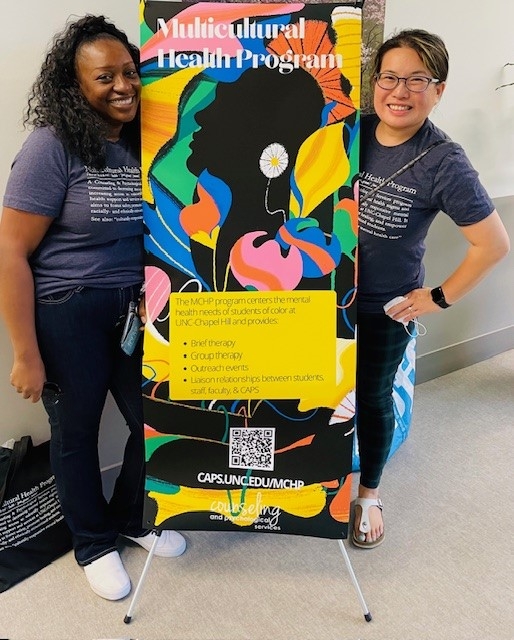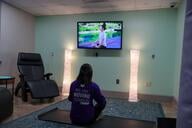You have /5 articles left.
Sign up for a free account or log in.

In 2020, UNC at Chapel Hill launched a multicultural counseling program to support learners from diverse backgrounds through connecting them with individuals who empathize with their experiences.
Tar_Heel_Rob/iStock/Getty Images
As student mental health needs have grown since the start of the COVID-19 pandemic, colleges and universities have bolstered their on-campus and telehealth services to meet student demand for counseling and support.
One notable challenge in expanding services has been hiring and retaining diverse counseling staff who can support learners from various backgrounds, something students say they want. A 2023 Student Voice survey by Inside Higher Ed, conducted by College Pulse, found 28 percent of respondent students want their institution to improve access to counseling staff they can relate to.
The University of North Carolina at Chapel Hill created a pilot program in 2020 to improve diversity within its counseling center, the Carolina Multicultural Health Program (MCHP) which added four staff members to the counseling and psychological services (CAPS) division and bolstered targeted support.
Over the past four years, campus leaders have identified ways to reach students of color and international students, connecting them to mental health resources and encouraging help-seeking behaviors that acknowledge their cultural backgrounds.
What’s the need: Conversations for a multicultural counseling initiative started in the spring of 2020, when students were petitioning administration for more representation in the counseling center.
“That was always a goal of ours, CAPS and student affairs, but now we had the student voices behind it, saying it’s really important with everything going on, that we have folks that represent the student body,” says Erinn Scott, assistant director of MCHP.
UNC Chapel Hill’s undergraduate student population is majority white (54 percent), and has around 8 percent Black/African American, 9 percent Hispanic/Latino, 14 percent Asian and 5 percent two or more races, as of fall 2022 data. An additional 2 percent of students are classified as “unknown or non-resident alien.”
The CAPS team held internal meetings about how to center the needs of underrepresented students (students of color and international students, specifically) and what a program could look like, which evolved into MCHP. Scott and her then-colleague Cherish Williams were chosen to lead the initiative and launched the program that same year, hitting the ground running.
A Bigger Picture
Supporting student mental health is a top priority for college leaders as they consider retention and persistence of their learners. A March 2023 survey from Inside Higher Ed found two-thirds of college presidents are “very aware” of the state of their students’ mental health, but only a quarter of respondents strongly agree their institution has sufficient capacity to meet those needs.
Around two-thirds of students (63 percent) say they have never used mental health resources from their college, including on-campus counseling, telecounseling, an off-campus therapist referral, mental health hotline or urgent counseling for a critical issue, according to a 2023 Student Voice survey by Inside Higher Ed. This grows to 65 percent among Black students.
While students say they want counseling staff who share their experiences and backgrounds, many campus counseling centers are not a reflection of their student body. Partnering with a third-party telecounseling services can increase access to staff, but outsourcing this work can be isolating to students, removing them from community experts who know the institution and exist within the system.
How it works: During the pilot year, CAPS hired four staff members to launch the program. MCHP is embedded within the CAPS office, functioning as a smaller team within the larger office, but still aligned with the wider goals, Scott explains.
In the first year, Scott and Williams set a goal to demonstrate how valuable the program could be in meeting student needs, gaining campus buy-in and establishing permanent financial support.
One of the key initiatives was reaching students and dismantling pre-existing notions about receiving mental health support or perceived barriers to access.
“There’s still stigma in communities of color, so our guiding principle was to go where students are, let’s meet them where they are,” Scott says.

Erinn Scott (left), assistant director for multicultural health and Susan Chung (right), clinical social worker and part of MCHP, pose with a banner that advertises the various services MCHP offers to students on campus. Staff have focused on outreach and ensuring all students know they can be seen and supported through CAPS.
Erinn Scott
In 2021, the program gained permanent funding, which gave staff time to identify their mission statement, identify goals and create a shared vision across the institution.
Now, the group regularly leads educational sessions, hosts individual and group counseling sessions for students, and partners with campus community members to identify and meet student needs. Students, upon intake to the counseling center, can request to speak with someone who shares their identities, and CAPS does their best to match that, Scott explains.
Most students engage with the department through events and partnerships, but the office also receives a high number of referrals from other CAPS counselors or faculty members who believe a student could benefit from the program.
What works: After three years of work, Scott identified some of the key actions and elements that help MCHP succeed on campus:
- Delivering extensive outreach. MCHP counselors partner with various groups across campus to ensure they’re engaging with all kinds of students—speaking in classrooms, working with student organizations or leading workshops. Each fall, MCHP hosts a meet-and-greet event to connect with student leaders, faculty members and student affairs folks and highlight their programs. Scott often makes cold calls or attends other campus events to be constantly relationship-building across campus divisions, as well.
- Hosting regular events. Because so much of what MCHP does is outreach, identifying student needs and how that is driven by the academic calendar allows staff to spend dedicated time on campus and respond to those needs. These events also help build trust among communities and cultures who may have some hesitancy to engage in counseling, Scott says.
- Identifying staff passions. MCHP counselors are trained and onboarded through the larger CAPS department but they also work with Scott to identify student groups or identities that they hold a passion for to make connections to and engage with those learners.
- Collecting student feedback. Part of serving underrepresented students is learning what they want to hear, Scott explains. This can happen anecdotally through student organization leaders and student surveys or through departmental data collection to understand which events were well-attended and engaged with. Some of the themes that have emerged since launching are healthy relationships for international students who are navigating cross-cultural expectations or self-care while living at home or with family.
- Investing in personnel. Counseling staff, in general, can feel burned out by the work, so creating structures that invest in and humanize staff and prioritize their wellness is also important. “When you’re supporting students with shared identities, it’s important to figure out what self-care looks like for you,” Scott says. “I’m thinking about particularly 2020, and how hard that was for all of us, as we were supporting students and holding spaces.”
- Receiving top-down support. Retaining and supporting diverse staff is a challenge nationally for predominately or historically white institutions, but having a leadership that acknowledges the need to invest in personnel as well as in their passions and interests has been beneficial, Scott says.
Do you have a wellness tip that might help others encourage student success? Tell us about it.




